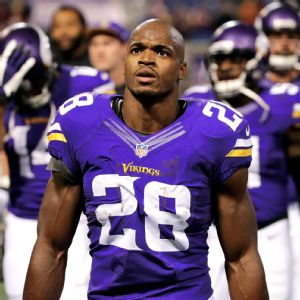The underlying problem in the NFL
In the span of less than a month, the domestic violence cases of Ray Rice, Jonathan Dwyer, Greg Hardy and Adrian Peterson have scorched the earth of the National Football League.
After the video surfaced of Rice knocking his then-fiancée out cold in a Las Vegas elevator, the attention towards NFL misconduct indeed spread like wildfire over the following two weeks.

Minnesota Viking’s star running back Adrian Peterson has been on the NFL’s exempt player list since Sept. 17. — Tom Dahlin | Getty Images
Rice was suspended indefinitely by the NFL and cut by the Baltimore Ravens. The Carolina Panthers deactivated Hardy, who over the summer was found guilty of assaulting his former girlfriend. Dwyer faced charges of physically abusing his wife. And Peterson turned himself into local authorities for striking his son with a switch.
Since, the NFL has lost the viewership of some fans, the trust of many fans and the faith of nearly all fans. Burn, baby, burn.
Yet, the kind of delinquency that has recently marred the NFL is certainly nothing new to the league. Over the past few decades, the misconduct of NFL players and officials has frequently sparked public outrage.
In a sport where hitting and tackling is a means of making a living, the conception that “violence breeds violence and other bad things” is commonly accepted. But as much as this year has spotlighted NFL athletes’ off-the-field problems, it has also revealed that transgressions in this league don’t end at the guys giving and taking the hits.
Despite widespread pleas for Washington Redskins owner Dan Snyder to change his team’s racially insensitive name, Snyder has imposed a negative light on his staff, players and the league by refusing to do so.
Meanwhile, according to an ESPN Outside the Lines report last month, Ravens owner Steve Bisciotti and other Ravens executives had asked NFL commissioner Roger Goodell to limit Rice’s suspension to two games.
The article also cites sources who suggest that Goodell is friends with and shows favor to certain NFL owners. Let’s remember that fact that the owners are also the only ones who can fire the commissioner.
In just the past month, Goodell has heard many calls for his resignation over his handling of the Rice case.
In July, Rice apologized for assaulting his now-wife, and whether or not Goodell was doing Bisciotti a favor in initially suspending Rice for only two games, the commissioner only lengthened the suspension two months later, when the video arose – a tell-tale sign that Goodell was motivated by image protection rather than moral obligation.
While I by no means equate egregious acts of domestic abuse to what the owners have done, the actions of these few NFL higher-ups have proven that the attitude is the same at both the executive and player levels – that they think of themselves to be beyond ethical boundaries and shielded by their status.
And in the NFL, a nonprofit organization (you read that correctly) exempt from federal taxes which until just this week deprived fans of games on television if they weren’t sold out, there’s no taking chances when it comes to protecting the product.
In truth, the NFL has cultivated a disease of delinquency that extends well beyond its players – a “Mr. Untouchable” complex that starts at the top.
But contrary to what they might believe, the NFL owners, executives and commissioner are not Teflon, and we are just now beginning to show that.
The FCC just recently voted to repeal the NFL’s blackout rule that keeps fans from watching non-sold out games on television.
The United States Patent Office months ago cancelled the trademark one the Redskins name, allowing anyone to use it royalty-free. Several senators have proposed repealing the NFL’s nonprofit status in response to some or all of the latest NFL controversies – Senator Cory Booker introduced a bill into congress last month following the Rice video fiasco that would repeal the league’s nonprofit status and proceeding the money to domestic abuse prevention programs.
And with so many people calling out Roger Goodell, the commissioner has been put on notice that losing his job is a plausible reality.
From 32 teams with 52-plus players and multiple owners for some, more players and owners than not find themselves on the right side of the legal and moral line.
We saw last month, however, that it just takes a few delinquencies to tarnish the reputation of the league.
As we take the aforementioned strides to remove the façade of immunity from the NFL higher-ups, we might hopefully be headed in the right direction to institute a league that prioritizes morality at the administrative level and will cut out delinquency at the player level.
